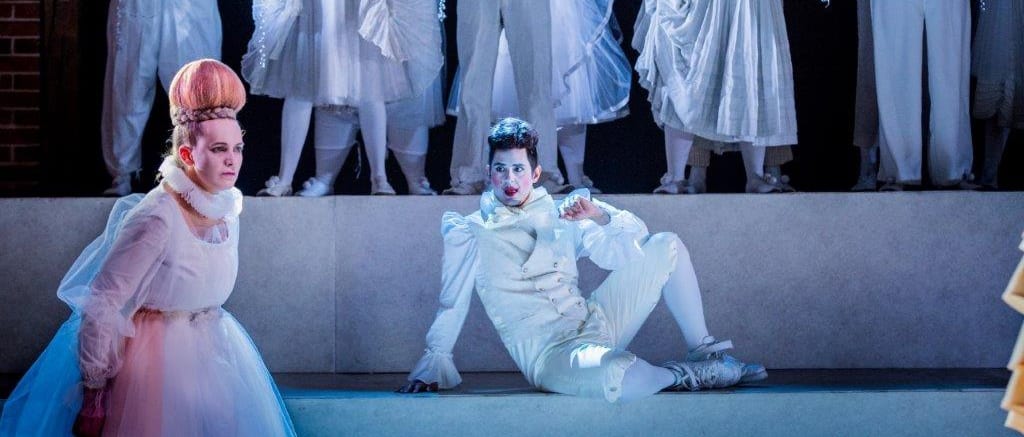The admirable Bury Court Opera has brought us another specially commissioned work by promising young composer Noah Mosley. It’s a bizarre tale of lost princes, rebellious princesses, good and bad witches and Mother Nature – perhaps a new age Magic Flute for climate change warriors. The opera is brimming with clever ideas – sometimes too many for its own good – but not all of them work as well as they might and the overall impression is of an enjoyable but uneven piece.
Aurora is the daughter of King Doleda. She is pining away in the suffocating court of her over-protective father. In desperation, he turns to a wild woman he meets in the forest to beg for a remedy for his daughter’s sickness. She cures her by revealing to Aurora the secret spell of Dawn – to counteract the ‘illness of the Night’ from which she suffers. She is cured but she ignores the wild woman’s advice to stop using the spell once she is well and, as she has been warned, the Spirits of Nature begin to suffer and to seek revenge. To put things right, the wild woman and her friends unwisely seek the help of the Big Witch of the Mountain who decides to capture Aurora to extract from her the secret of the spell. Rock spirits and water nymphs are drawn into the conflict, as is an exiled prince from a neighbouring land, and all is resolved in a magical climax on the summit of the mountain.
The opera is lit up by two spirited performances. Isolde Roxby as Princess Aurora sings, and acts, the role with total commitment and a bright soprano voice that would be ideal in Mozart operas. Just as impressive is mezzo Katherine Aitken prowling around the stage, twitching her tail, bossing the king and inciting mayhem in the mountains. It’s another vocally accomplished and physically adventurous performance. Andrew Tipple makes an effective king, torn between his vision of himself as dominant monarch and his realisation that his daughter needs help that he cannot give. As the exiled prince – no name but he might well be called ‘Taminetto’ – fine tenor Dominic Bowe makes the most of a rather slight role and came into his own in the final scene in a love duet that had hints of Verdi about it.
Noah Mosley throws every musical style you can think of into the mix – Mozart, Verdi, Broadway musical, medieval polyphony, French chanson – but this melange does not always seem entirely at the service of the story. At moments it reaches real heights of beauty – for example when the king sings of his love and concern for his daughter – but often we get fine passages that taper away into the musical mayhem. And the story is a bit of a mess, packing too much incident into a two-act opera of modest length. Elisabetta Campetti’s libretto plays with many fascinating ideas – for example, about the self-importance of humans and the way that nature can both harm and heal – but perhaps too many to bring coherence to the story. And again there is an unevenness about the language that sometimes has poetic charm and sometimes a prosaic banality that doesn’t quite fit the magical ambience.
Director, Aylin Bozok finds all sorts of ingenious ways to conjure up this fairy tale world and to keep the story moving briskly forward and she marshals the multi-role singing chorus – who risk life and limb clambering up and down between the three levels of the performing space – and who sing (and dance) with real aplomb. The costumes are splendid though the gradual change from pristine white to grubby grey is better explained in the programme notes than on the stage. Mosley conducts himself, and his young orchestra produces a convincing reading of the varied score. It is, as ever, a thoroughly enjoyable experience to hear a new piece brought to life by its composer with the help of such a committed team of performers and behind-the-scenes people but this opera doesn’t quite reach the standards that would recommend it to other small companies in the thriving world of small venue opera.

